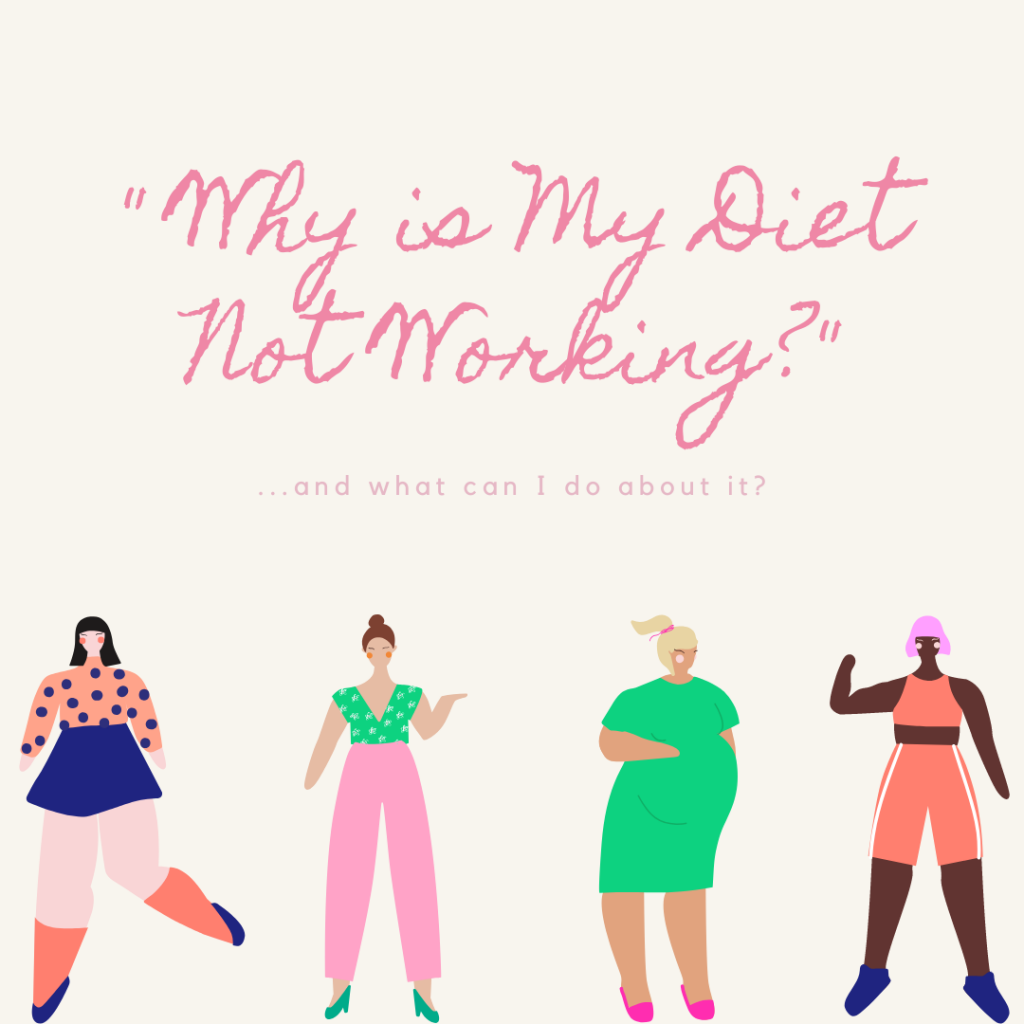
Dieting is not rare in our society – some research has found that, at any one time, more than half of women are on a diet1,2. It makes sense that dieting is something that draws us in – the advertisements that we see on television and social media seem so appealing with their dramatic “before and after” images and promises of success. But how come when we try it ourselves, we don’t tend to see the same results?
Part of the reason could be that we are actually being too restrictive. In order to lose weight, our bodies need to be in a calorie deficit3. This means that we need to be taking in fewer calories than we’re burning3. This is perfectly logical, but some people take it too far:
“If being in a moderate calorie deficit helps me to lose weight, then being in an even greater calorie deficit should help me lose even more weight!”.
Extreme calorie restriction can have negative consequences on our bodies, thoughts and feeling, and can potentially stall weight loss efforts.
When we restrict too much, we become more sensitive to cravings. One study found that, compared to non-dieters, dieters reported more frequent and more intense food cravings4. This feeling many resonate with many. You may feel out of control around so-called “forbidden foods” which can lead to overeating and feelings of guilt afterward.
It’s important to recognize that you are not alone in feeling this way. It doesn’t mean that you lack self-control or willpower. It may simply be your body’s way of telling you that it needs more nutrition.
Despite popular opinion, giving in to our cravings can sometimes help us manage our weight4. It’s been found that, compared to those who resisted, dieters who gave in to their cravings reported a significant decrease in hunger and feelings of craving4. This means that, by allowing yourself to have a food that you really crave (and not substituting the craving with something else), you can move on with your day rather than remaining preoccupied with your intense desire for the food.
As well, eating the food you crave may be more beneficial than substituting it for another food item. Often, we’re prone to eating even more of the substitute than we would have in the first place if we just ate what we were craving. Seems crazy, right?! Next time you have a craving for something, I challenge you to try this out and see if it works for you.
Another reason why we aren’t as successful with dieting is that we’re too hard on ourselves when we have slip-ups. Dieting is associated with feelings of guilt, shame, lowered self-esteem, and self-blame5. Research shows that, when we “fail” at a diet, many of us blame ourselves or our personality traits for the lack of success5. This can become a cycle, where we continue to try diets, experience a lack of success, and then seek out the next best option5.
Instead of blaming ourselves when diets don’t go the way we hoped, it may be more productive to reflect upon why we were “unsuccessful”. Society and diet culture tell us over and over that, if we only tried harder, we would be able to lose the weight and keep it off for good. However, it’s important to recognize that it is not that easy. Diets with unrealistic expectations and restrictive plans are setting you up for failure.
So, what can you do to help reduce the cycle of dieting, failing, and then doing it all over again? Think about what you need from a diet. Some people prefer to have a support network, while others prefer a more solo effort using other weight loss tools like calorie counting or personal goal setting6.
It can also be helpful to consider barriers that you may need to overcome in order to be successful. Does your work schedule get in the way of eating healthy? Do you get sick of eating the same meals over and over? When we consider our barriers ahead of time, we can create proactive strategies to shut them down fast.
Finally, think about what would be sustainable for you. Does drinking diet shakes for all meals or only eating between the hours of 12-6pm make sense for the rest of your life? Probably not. Instead, try to think of your diet as a lifestyle change. It’s been found that people who look at dieting from this perspective are more likely to stick with a plan in the long-run2.
Most importantly, don’t be too hard on yourself if things don’t go as planned! Remember that dietary changes take work and nobody is perfect.
Contributor: Madeleine Farquhor, BSc., MPH Nutrition and Dietetics (candidate)
Editor: Breanne Drury, RD, MHScEd (candidate)
Posted March 13, 2020
References:
- Neumark-Sztainer D, Rock CL, Thornquist MD, Cheskin LJ, Neuhouser ML, Barnett MJ. Weight-control behaviors among adults and adolescents: associations with dietary intake. Preventive medicine. 2000 May 1;30(5):381-91.
- Bacon L, Stern JS, Van Loan MD, Kein NL. Size acceptance and intuitive eating improve health for obese, female chronic dieters. Journal of the American Dietetic Association. 2005;105:929-936.
- Melly C. The one reason why you’re not losing weight is simpler than you’d think. Forbes. 2 July 2018. Available from: https://www.forbes.com/sites/callummelly/2018/07/02/the-one-reason-why-youre-not-losing-weight-is-simpler-than-youd-think/#59ecf9575466.
- Massey A, Hill AJ. Dieting and food craving. A descriptive study. Appetite. 2012;58:781-785.
- Thomas SL, Hyde J, Karunaratne A, Kausman R, Komesaroff PA. “They all work…when you stick to them”: A qualitative investigation of dieting, weight loss, and physical exercise, in obese individuals. Nutrition Journal. 2008;7(34).
- Solbrig L, Jones R, Kavanagh D, May J, Parkin T, Andrade J. People trying to lose weight dislike calorie counting apps and want motivational support to help them achieve their goals. Internet Interventions. 2017; 7:23-31.

